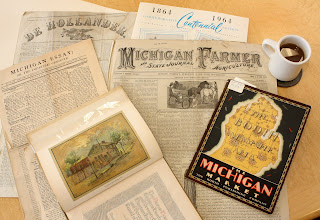Mibiz.com
Tuesday, February 17, 2009
An article about WM newspapers
Here is a link to an article about the business of journalism, focusing on West Michigan:
Saturday, February 14, 2009
CMU Library exhibit on Michigan Newspapers

During the Michigan Press Association's winter conference in Grand Rapids, I had the opportunity to speak with Frank Boles, director of Clarke Historical Library at Central Michigan University in Mount Pleasant. Mr. Boles was on hand to display the libraries new feature: Celebrating Two Centuries of Michigan Newspapers. As a graduate of the journalism program at CMU (1995), I was pleased to learn my alma mater was recording the history of a business that is so vital to our countries history. In many ways, as Mr. Boles told me, newspapers are the first draft of our history. They tell is what is happening now. Books and other media tell us more in depth about our history much later.... The photo is courtesy of the Clarke Historical Library, displaying some of Michigan's rich history of large and small newspapers that continues today.
According to a press release by Mr. Boles, the library display is focused on:
*The importance of newspaper as information resources
*The longevity of newspapers as a means of communication
* The importance of preserving newspapers as historical resources
The state of newspapers
It really is doomsday out there. Newspapers are in serious decline and have no real chance to survive in their traditional formats, if you believe the pundits. But that's like listening to popular opinion about anything - it's the loudest who are heard most.
Doing a little deeper digger reveals a lot of great things going on in the newspaper business - some new and some very old. Like this from www.stateofthenewsmedia.org "On an average day, roughly 51 million people still buy a newspaper, and 124 million in all still read one."
That's not bad. Reports will often also show as a business, newspapers are making money. Like many businesses in the midst of our difficult economic times they are not making as much profit as they did five years ago and they often are not meeting projections. Does that mean they are not good businesses in the long run?
I don't dismiss the fact many newspapers are ailing. Just look at the Detroit Free Press, which is cutting home distribution to only three days a week. This is a 177-year-old newspaper that produces great investigative reporting. But is it the newspaper that is the problem or the business operations? I'm not convinced the product is the biggest issue. I believe many people still want their local paper to read good, well reported news about local issues. And newspapers are still the most reliable place to obtain that information.
Of course, newspapers have evolved over the last few hundred years and they must continue to do so. That does not only mean online. It also means in print. Many newspapers across the country continue to pay the bills with the print edition. For a decade or more many of those same papers have been sinking money into online ventures of all sorts hoping it will pay off one day. To date, it is not paying off for the vast majority of them. In fact, I'd be hard pressed to find a paper that has come close to a return for every dollar it has invested in online products. It can be argued that most papers would have been better off business-wise to continue operating as a print edition, investing the money in more graphics artists, more investigative reporting and the tools to do that work.
Stopping there would be ignoring the demand for online news. I don't believe that is wise. However, the format for online news that will be successful with consumers is really still evolving. It may require joint ventures between news outlets, better presentation and improved involvement with consumers. Those are just some of my ideas.
In the mean time, I propose we stop pushing print newspapers under the bus while they are struggling due to some extenuating circumstances: online products that have not paid off and tough economic times. Let's look at print media on its own merits. There still are many positive qualities to strong, traditional print journalism.
Subscribe to:
Posts (Atom)